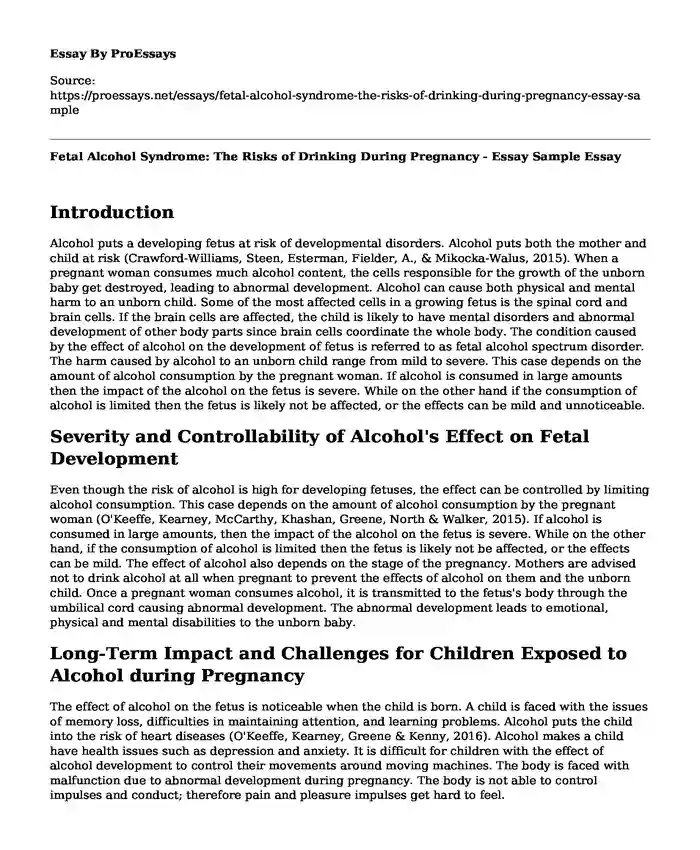Introduction
Alcohol puts a developing fetus at risk of developmental disorders. Alcohol puts both the mother and child at risk (Crawford-Williams, Steen, Esterman, Fielder, A., & Mikocka-Walus, 2015). When a pregnant woman consumes much alcohol content, the cells responsible for the growth of the unborn baby get destroyed, leading to abnormal development. Alcohol can cause both physical and mental harm to an unborn child. Some of the most affected cells in a growing fetus is the spinal cord and brain cells. If the brain cells are affected, the child is likely to have mental disorders and abnormal development of other body parts since brain cells coordinate the whole body. The condition caused by the effect of alcohol on the development of fetus is referred to as fetal alcohol spectrum disorder. The harm caused by alcohol to an unborn child range from mild to severe. This case depends on the amount of alcohol consumption by the pregnant woman. If alcohol is consumed in large amounts then the impact of the alcohol on the fetus is severe. While on the other hand if the consumption of alcohol is limited then the fetus is likely not be affected, or the effects can be mild and unnoticeable.
Severity and Controllability of Alcohol's Effect on Fetal Development
Even though the risk of alcohol is high for developing fetuses, the effect can be controlled by limiting alcohol consumption. This case depends on the amount of alcohol consumption by the pregnant woman (O'Keeffe, Kearney, McCarthy, Khashan, Greene, North & Walker, 2015). If alcohol is consumed in large amounts, then the impact of the alcohol on the fetus is severe. While on the other hand, if the consumption of alcohol is limited then the fetus is likely not be affected, or the effects can be mild. The effect of alcohol also depends on the stage of the pregnancy. Mothers are advised not to drink alcohol at all when pregnant to prevent the effects of alcohol on them and the unborn child. Once a pregnant woman consumes alcohol, it is transmitted to the fetus's body through the umbilical cord causing abnormal development. The abnormal development leads to emotional, physical and mental disabilities to the unborn baby.
Long-Term Impact and Challenges for Children Exposed to Alcohol during Pregnancy
The effect of alcohol on the fetus is noticeable when the child is born. A child is faced with the issues of memory loss, difficulties in maintaining attention, and learning problems. Alcohol puts the child into the risk of heart diseases (O'Keeffe, Kearney, Greene & Kenny, 2016). Alcohol makes a child have health issues such as depression and anxiety. It is difficult for children with the effect of alcohol development to control their movements around moving machines. The body is faced with malfunction due to abnormal development during pregnancy. The body is not able to control impulses and conduct; therefore pain and pleasure impulses get hard to feel.
Conclusion
A child born with the effect of alcohol during pregnancy may have facial disorders. A child may have a big, small, or lack some features. Alcohol may lead to some congenital disabilities such as stillbirth, miscarriage and abnormal birth. Alcohol consumption by a pregnant mother may cause genetic abnormalities to the unborn child. This feature may not be recognized even after birth. Some traits may be transferred to the child are not of the parents' link. It is difficult for children exposed to alcohol before birth to connect with parents and other kids in their growth period. There is the effect of children exposed to alcohol during pregnancy to have growth problems. The fetal alcohol spectrum disorders differ from child to child, depending on the amount of alcohol in their body. Alcohol has the effect of a child been born earlier than expected if the pregnant woman consumes it in large amounts.
References
Crawford-Williams, F., Steen, M., Esterman, A., Fielder, A., & Mikocka-Walus, A. (2015). "My midwife said that having a glass of red wine was actually better for the baby": a focus group study of women and their partner's knowledge and experiences relating to alcohol consumption in pregnancy. BMC pregnancy and childbirth, 15(1), 79. Retrieved from; https://bmcpregnancychildbirth.biomedcentral.com/articles/10.1186/s12884-015-0506-3
O'Keeffe, L. M., Kearney, P. M., Greene, R. A., & Kenny, L. C. (2016). Alcohol use during pregnancy. Obstetrics, Gynaecology & Reproductive Medicine, 26(6), 188-189. Retrieved from; https://bmjopen.bmj.com/content/5/7/e006323?itm_content=consumer&itm_medium=cpc&itm_source=trendmd&itm_term=0-A&itm_campaign=bmjo
O'Keeffe, L. M., Kearney, P. M., McCarthy, F. P., Khashan, A. S., Greene, R. A., North, R. A., ... & Walker, J. J. (2015). Prevalence and predictors of alcohol use during pregnancy: findings from international multicentre cohort studies. BMJ open, 5(7), e006323. Retrieved from; https://bmjopen.bmj.com/content/5/7/e006323?itm_content=consumer&itm_medium=cpc&itm_source=trendmd&itm_term=0-A&itm_campaign=bmjo
Cite this page
Fetal Alcohol Syndrome: The Risks of Drinking During Pregnancy - Essay Sample. (2023, Mar 09). Retrieved from https://proessays.net/essays/fetal-alcohol-syndrome-the-risks-of-drinking-during-pregnancy-essay-sample
If you are the original author of this essay and no longer wish to have it published on the ProEssays website, please click below to request its removal:
- Essay Example: Is Angie Bachmann Responsible for Her Gambling Debts?
- Nursing Care Models Paper Example
- Essay Example on EEOC: Protecting Employees From Discrimination & Retaliation
- Article Analysis Essay on Obesity Management Strategies
- Essay Example on American Red Cross: Helping People in Need
- Violence in Video Games Effect on Children Essay Example
- Essay Example on Women in Agriculture: A Growing Concern







